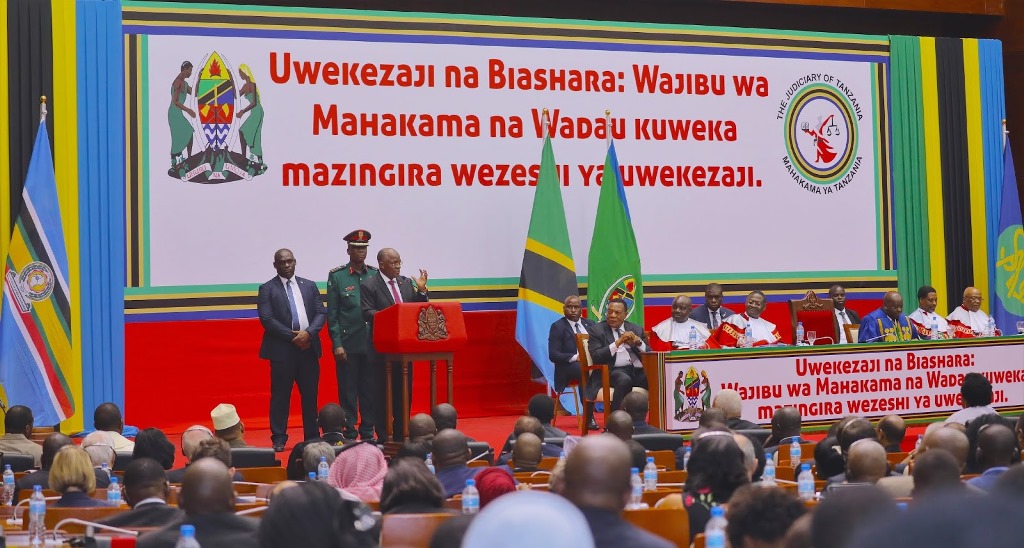Author: DEUS NGOWI
AfricaPress-Tanzania: FORMULATION of good policies has greatly contributed to gains recorded in the fields of investment and trade in the country.
Under the leadership of President John Magufuli, the government strictly adhered to the Chama Cha Mapinduzi 20 15 -20 20 Election Manifesto of creating a conducive climate for investors by removing barriers and fighting the cumbersome bureaucratic procedures.
As the Fifth Phase Government starts its final second fiveyear term today, it has much to count on the gains recorded in past five years.
Chapter two of the CCM 20 15 -20 20 Election Manifesto deals with achievements and targets in the production sector, and in Clause 33 the ruling party pledged to direct its government to throw much weight in completing and implementing the third Sustainable Industrial Development Policy (2010 -20 20 ).
The policy seeks to enable the industrial sector to contribute in reaching the long-term development targets as outlined in the National Development Vision 20 25.
Among the achievements gained in the past five years is the steps taken to implement the Blueprint for Regulatory Reforms to Improve the Business Environment and the formation of a new ministry to deal with investment.
This ministry was created in January last year and placed under the Prime Minister’s O ffice to boost investment promotion initiatives as the government sought to open up the country for industrialisation.
Dr Magufuli, also CCM Chairman, spearheaded the reform of some laws to curb bureaucratic delays in issuing investment permits, the scrapping of some charges, duties and taxes in various key sectors of the economy such as agriculture, fisheries and livestock.
Such government actions have increased Tanzania’s foreign trade from 11.5tri/- in 2014/20 15 to 16.6tri/- in 20 18/20 19. The country has had a positive ration in sales of goods in regional groupings such as the East African Community (EAC) markets and the Southern African Development Community (SADC).
Foreign trade is the exchange of goods and services between the domestic sector of a given nation and other nations. The exchange of production is comparable to any exchange, except that buyers and sellers are from different countries.
A vivid example of feats in the foreign trade is that since 20 15 to 20 18 Tanzania had positive proportion of goods sales by an average of 288.04 million US$. As for investment projects, the Tanzania Investment Centre (TIC) has registered 1,307 new projects worth 14.607bn US$ (30 tri/-) and when completed will create 183,50 3 jobs.
The 20 215 -20 20 CCM Election Manifesto lays emphasis on implementation of the Second Development Plan that seeks to develop the industrial economy by starting with basic industries. The said industries were to contribute more to the Gross Domestic Product (GDP) from a mere 9.9 per cent in 2013 to 15 per cent this year. It directed the industries to use locally available raw materials.
“To initiate a consistent strategy to encourage the private sector to establish large and medium industries and put in place mech anisms to protect them against foreign industries; create a conducive environment to reduce investment and operating costs,” the Manifesto reads in part.
It also directed the government to ensure that the industrial sector increases market opportunities, especially with preferential tariffs such as the EAC and SADC. The Blueprint for Regulatory Reforms to Improve the Business Environment was released in Dodoma in April 2018.
Prime Minister Mr Kassim Majaliwa noted that it provided a guide to achieving the industrialisation dream of creating, in the shortest period possible, the required business-enabling environment where the government and the private sector work handin- hand in realising the dream.
The Blueprint comprehensively analysed the existing regulatory challenges taking into account best practices internationally and proposed robust principles and guidelines for reforms. It articulated clearly general and specific areas for reform and ways of implementing them with necessary adjustments to suit local conditions pertaining to the country.
It set out a benchmark for undertaking a holistic approach to overcoming the challenges and constraints affecting policy, regulations, delivery, and coordination that retard the growth of the private sector.







